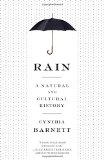Summary | Excerpt | Reviews | Beyond the Book | Readalikes | Genres & Themes | Author Bio

Critics' Opinion:
Readers' Opinion:
First Published:
Apr 2015, 368 pages
Paperback:
Apr 2016, 368 pages
 Book Reviewed by:
Book Reviewed by:
Poornima Apte
Buy This Book
Excerpt
Rain
From those cataclysmic torrents 4 billion years ago to the hydrologic cycle that slakes aquifers, soil, and rivers day after day, rain, as the source of Earth's water, became the wellspring of life. "Sunshine abounds everywhere," the American nature writer John Burroughs wrote in a paean that soaked nine pages of Scribner's magazine in 1878, "but only where the rain or dew follows is there life."
Life, and something more. Humans have a natural affinity for rain, grounded in its necessity for civilization and agriculture. Thomas Jefferson constantly watched the sky from his Monticello home in Virginia, where cerulean thunderclouds build along the Blue Ridge Mountains as if matched by Picasso. Jefferson fretted over cloudless days the way that all farmers do. He found relief when storms returned, carrying moisture from the yet-mysterious West. His letters often closed with a word on the rain—or the lack. "Not enough rain to lay the dust," he would lament. Or he'd gratefully share news of "a fine rain," "a divine rain," "plentiful showers."
Sometimes, after writing to his fellow statesman James Madison, who measured rain in a tin cup nailed to the front gate at his Montpelier estate thirty miles northeast, Jefferson would hold off sealing the letter until morning so he could report the overnight showers at Monticello. "The earth has enough," Jefferson concluded after one such update, "but more is wanting for the springs and streams."
Wanting is apropos, a hint at something more. For the story of rain is also a love story—the tale of "certain unquenchable exaltation" that the poet William Carlos Williams felt as he beheld his storied red wheelbarrow
glazed with rain
water.
And for all of history, it has inspired all the excitement, longing, and heartbreak that a good love story entails. The first civilizations rose and fell with the rain, which has helped shape humanity since our earliest ancestors radiated out of Africa when the rainfall tapered off and the forests turned to savanna grasslands. Every culture had its own way of worshipping rain, from Mesoamerican cave paintings exalting rain deities to modern Christian governors who call prayer for a storm.
Rain and two more of its wondrous pride—clouds and rainbows—
have inspired writers, painters, and poets for thousands of years. Homer's Iliad is thick with clouds, as is much of the ancients' poetry and prose. The modern poets wrote unforgettably of rain—what Conrad Aiken called the "syllables of water." Other authors awakened in its absence: Mary Austin, Willa Cather, and Wallace Stegner all found their muse in thirsting lands. True, the sun and the wind inspire. But rain has an edge. Who, after all, dreams of dancing in dust? Or kissing in the bright sun?
We long for rain especially when we've gone without. Rain is bliss when topsoil has turned to dust; when springs have vanished; when frogs have gone silent; when fish have rotted to eye socket on dry lake; when corn has blackened on the stalk; when fat cattle have shriveled to bone; when half a billion Texas trees have perished; when bushfires have incinerated Australia; when unthinkable famine has spread through North Africa.
And then, fast as hundred-mile-per-hour winds, a celebration of rain can turn to terror and the deepest grief. Consider the stormy evening of January 31, 1953, in the Netherlands. Dutch families in the coastal provinces of Zeeland and South Holland had gone to sleep in a festive mood. It was Princess Beatrix's fifteenth birthday. Rain, wind, and waves drum-rolling into the jetties had amplified spirits.
By 2 a.m., the apocalyptic North Sea Storm was pushing floodwaters over dikes and wooden barriers "like boiling milk." When it was over, when all the lost souls were finally counted, they numbered 1,835. Half a century later, another biblical flood, Hurricane Katrina in New Orleans, took 1,836.
Excerpted from Rain by Cynthia Barnett. Copyright © 2015 by Cynthia Barnett. Excerpted by permission of Crown. All rights reserved. No part of this excerpt may be reproduced or reprinted without permission in writing from the publisher.





The Flower Sisters
by Michelle Collins Anderson
From the new Fannie Flagg of the Ozarks, a richly-woven story of family, forgiveness, and reinvention.

The House on Biscayne Bay
by Chanel Cleeton
As death stalks a gothic mansion in Miami, the lives of two women intertwine as the past and present collide.

The Funeral Cryer by Wenyan Lu
Debut novelist Wenyan Lu brings us this witty yet profound story about one woman's midlife reawakening in contemporary rural China.
Your guide toexceptional books
BookBrowse seeks out and recommends the best in contemporary fiction and nonfiction—books that not only engage and entertain but also deepen our understanding of ourselves and the world around us.